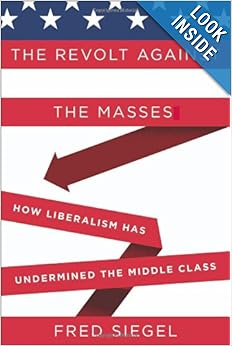 Here’s cultural commentator Fred Siegel, interviewed by Ed Driscoll, on the significance of the Scopes “monkey” Trial, as discussed in his new book, The Revolt Against the Masses. Referring to key 20th century trials, Siegel says,
Here’s cultural commentator Fred Siegel, interviewed by Ed Driscoll, on the significance of the Scopes “monkey” Trial, as discussed in his new book, The Revolt Against the Masses. Referring to key 20th century trials, Siegel says,
The second trial was the Scopes Trial, and this was even more important — far more important, because the Scopes Trial lives on today in liberal mythology. Liberals now want to call themselves progressives.
Because the Scopes Trial is about the case in Tennessee where a school teacher is supposedly persecuted for teaching Darwinism. None of this is true. And this is all written up by H.G. Wells, or an account of this is comes from a play really based on H.G. Wells’ account of the trial, which is still widely produced.
There was no repression in this town in Tennessee. Essentially what happened was the town fathers got together with the ACLU who both saw a chance to promote themselves. The town saw a chance to promote itself; the ACLU saw a chance to promote itself, the ACLU then being a nascent organization, a young organization. And so this was done in a jolly spirit. There was no — there was no threat of violence in the streets. This was one great big carnival.
At the trial itself, William Jennings Bryan, the former presidential candidate, is depicted as a rancid buffoon; just an evil, malevolent character. This is bizarre. In World War I it’s William Jennings Bryan who opposed World War I. It was his opponent, H.L. Mencken, who supported Germany in World War I and hoped for a German victory, and Mencken was very public about this.
This talking about things being airbrushed out of history. Mencken’s germanophilia has been airbrushed out of history.
Mencken loved Ludendorff, the German commanding general. He loved the Kaiser. And just about the time of the Scopes Trial, or shortly thereafter, he wrote a book explaining why democracy was a bad idea. And earlier he had hoped that Germany would conquer America and eliminate small-d-democracy.
So the case of who these people were, what they represented, has been grossly distorted over time. Bryan was anything but a buffoon.
In 1905, Bryan had already read Darwin and he debated Henry Osborn of New York’s Museum of Natural History about Darwinism. And his opposition to Darwinism was based on its Nietzschean consequences, the same Nietzsche who Darrow had invoked in the Leopold and Loeb trial.
This idea of backwards America, yearning to lynch people who were in disagreement with them, really takes hold right there, right around the Scopes Trial. We never quite recover from it.
And until then, there’s really no divergence in America between religious belief and the public culture. That gap is created by this Scopes Trial and has grown annually ever since.
Others have pointed out the same sorts of things, for example Edward Larson in Summer for the Gods. But if one’s neighbours actually listen to and believe deadtree media’s version, which supports the new autocrats, it pretty much doesn’t matter what really happened in this or any other situation. Free peoples must make a duty of remembering their history correctly.
Follow UD News at Twitter!